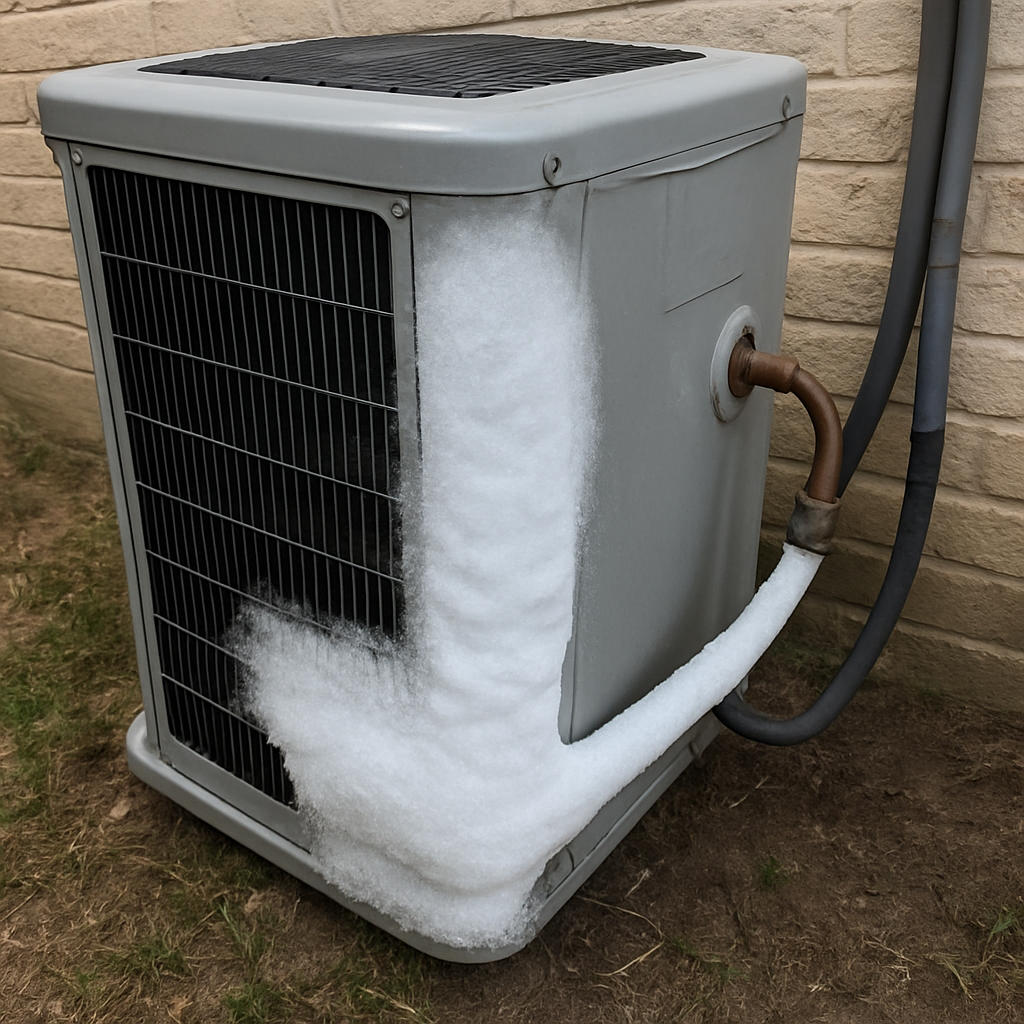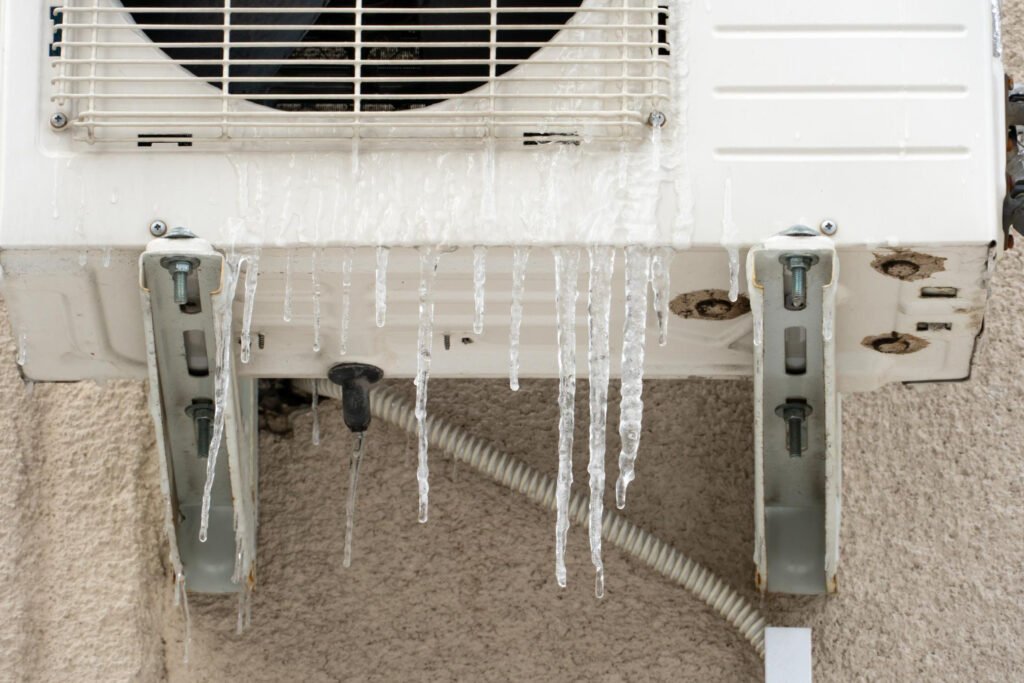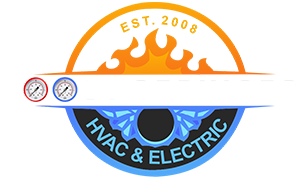A well-functioning air conditioning system is essential for comfort in your home, especially during the scorching summer months. Without it, the indoor temperature can quickly become unbearable, affecting your daily routine and overall well-being. Recognizing the signs your AC unit is freezing can prevent bigger problems down the road. Early detection not only saves on repair costs but also prolongs the lifespan of your unit. Here are some common indicators that your air conditioner might be freezing up:

Table of Contents
Common Signs Your AC Evaporator Coils Are Freezing
Reduced Airflow
If you notice that the airflow from your vents has diminished significantly, it could be a sign of an issue. Reduced airflow is often one of the first signs that the evaporator coils in your AC unit are starting to freeze. This can lead to uneven cooling in different rooms, making some areas of your home uncomfortable. Addressing this early can prevent further complications, such as increased wear on your system and higher energy bills.
Warm Air Blowing from Vents
Another telling sign is warm air blowing from your vents when the system is set to cool. This occurs because the ice on the coils acts as an insulator, preventing the refrigerant from absorbing heat effectively. Consequently, your unit works harder to reach the desired temperature, leading to increased energy consumption. Ignoring this sign can result in more severe damage, making prompt action essential.
Visible Ice on the Unit

Ice visible on the AC unit, especially around the evaporator coils, is a clear sign that your system is freezing. This ice can sometimes extend to the refrigerant lines and the outside unit. If left unchecked, the accumulation of ice can cause physical damage to the coils and other components, leading to expensive repairs. Regularly inspecting your unit can help catch this issue before it escalates.
Puddles of Water Around the Unit
As the ice melts, you might find puddles of water near your indoor air handler. This can lead to water damage if not addressed promptly. Water damage can affect floors, walls, and ceilings, leading to mold growth and structural issues. It’s crucial to address the source of the freezing to prevent further water-related problems.
Unusually High Energy Bills
If your energy bills are higher than usual without a change in your usage pattern, it might be due to a frozen AC unit. A system that’s working harder to maintain your desired temperature will consume more energy. Over time, this increased energy consumption can significantly impact your budget, making it important to resolve the underlying issue quickly. Monitoring your energy bills can be a useful way to detect potential AC problems early.
What Causes an AC Unit to Freeze Up?
Understanding the root causes of a frozen AC unit can help prevent the issue from recurring. By addressing these underlying problems, you can ensure your system operates efficiently and effectively. Here are some common reasons:
Insufficient Airflow
Blocked or restricted airflow over the evaporator coils can cause them to freeze. This might be due to dirty air filters, closed vents, or blockages in the ductwork. Ensuring regular maintenance and cleaning can help maintain optimal airflow. Keeping vents open and unobstructed is crucial for the efficient operation of your AC unit.
Low Refrigerant Levels
Low refrigerant levels can drop the temperature of the evaporator coil below freezing, causing moisture in the air to freeze on the coils. Leaks in the refrigerant lines are a common cause of low levels. It’s vital to have a professional check and refill refrigerant to prevent damage to the compressor and other components.
Thermostat Settings
Setting your thermostat too low can cause the system to run excessively, potentially leading to freezing. It’s important to find a balance between comfort and efficiency to avoid unnecessary strain on your system. Programmable thermostats can help manage your home’s temperature more effectively, reducing the risk of freezing.
Mechanical Failures
Faulty components like the blower fan or a malfunctioning thermostat can also contribute to freezing issues. Regular maintenance checks can identify these problems before they cause more significant damage. Replacing or repairing faulty components promptly ensures your system runs smoothly and efficiently.
See the Signs Your AC Unit is Freezing — and How to Fix It Fast
When faced with a frozen AC unit, there are some immediate steps you can take to mitigate the issue and restore your system’s functionality. Taking prompt action can prevent further damage and restore your comfort quickly:
Turn Off the AC
The first step is to turn off your air conditioner to prevent further damage. Let the ice melt naturally, which can take several hours. This allows the system to reset and can often clear minor issues without further intervention. After the ice has melted, you can turn the unit back on and monitor its performance closely.
Check and Replace Air Filters
Inspect your air filters and replace them if they are dirty. Clean filters ensure proper airflow, which is critical for preventing freezing. Regularly changing filters not only helps prevent freezing but also improves indoor air quality. Set a reminder to check filters monthly, especially during peak usage periods.
Clear Obstructions Around the Vents
Ensure that all vents are open and unobstructed to allow for adequate air circulation throughout your home. Furniture, curtains, or other items blocking vents can cause uneven cooling and increased strain on your system. Rearrange your furniture and decor to maintain clear paths for air circulation.
Inspect Refrigerant Levels
While it’s best to leave refrigerant handling to professionals, you can check for signs of leaks, such as hissing sounds or oily residue around the refrigerant lines. If you suspect a leak, contact a professional immediately to prevent further damage. Regular inspections by a certified technician can help maintain appropriate refrigerant levels.
Adjust Thermostat Settings
Make sure your thermostat is set to a reasonable temperature and that the fan is set to “auto” rather than “on” to avoid unnecessary running. This setting allows the fan to operate only when necessary, preventing continuous airflow that can contribute to freezing. Consider using a programmable thermostat to optimize energy use and maintain comfort.
Professional Help: When to Call an Expert

While there are some steps you can take to address a freezing AC unit, certain situations require professional expertise. Knowing when to call in a professional can prevent further damage and ensure effective repairs:
Persistent Freezing Issues
If your unit continues to freeze despite following DIY fixes, it’s time to call a professional to diagnose and fix the problem. Persistent issues may indicate a deeper mechanical or refrigerant problem that needs expert attention. A professional technician can perform a thorough inspection and provide a comprehensive solution.
Refrigerant Leaks
Handling refrigerants requires special training and equipment. If you suspect a refrigerant leak, contact a certified HVAC technician immediately. Attempting to fix refrigerant issues on your own can be dangerous and lead to further system damage. Professionals have the tools and expertise to safely address and repair leaks.
Mechanical Repairs
Issues with components like the blower motor, compressor, or thermostat should be handled by professionals to ensure safety and proper repair. These components are essential for the efficient operation of your AC unit, and improper handling can lead to additional problems. Regular professional maintenance can help identify and address mechanical issues early.
Preventing Future Freezing Issues
Regular maintenance and vigilance can go a long way in preventing your AC unit from freezing. By being proactive, you can enjoy consistent comfort and efficiency from your system:
Schedule Regular Maintenance
Having your system inspected and serviced by a professional at least once a year can catch potential problems early. Regular maintenance ensures all components are functioning correctly and can extend the lifespan of your unit. Develop a maintenance schedule and stick to it to keep your system in top condition.
Keep the Area Around the Unit Clean
Ensure the area around your outdoor unit is free of debris and plant growth that can obstruct airflow. This helps maintain optimal performance and prevents overheating and freezing. Regularly check and clear the area to support efficient operation.
Monitor Thermostat Usage
Avoid setting your thermostat too low, and use programmable settings to optimize the system’s operation. This not only prevents freezing but also reduces energy consumption and lowers utility bills. Educate your family members on the importance of responsible thermostat use.
Educate Yourself
Stay informed about your system’s operation and potential issues to address problems before they escalate. Understanding your AC unit’s needs and limitations can help you make informed decisions about maintenance and repairs. Consider attending workshops or reading materials on home HVAC systems.
Conclusion
A freezing AC unit in Pasadena’s hot climate can be a major inconvenience, but understanding the signs and causes can help you address the issue swiftly. By taking preventative measures and knowing when to call in the experts, you can keep your air conditioning system running smoothly and efficiently. Prioritizing regular maintenance and being proactive about potential issues will ensure comfort in your home all summer long. Ensuring your AC unit functions properly not only saves money but also provides peace of mind, allowing you to enjoy the summer without worry.
Common Questions — Signs Your AC Unit is Freezing
What are the most obvious signs my AC unit is freezing?
Typical signs include weak or no airflow from vents, lukewarm air after a short cool period, visible frost or ice on the copper refrigerant lines, and water around the air handler after the system shuts off and thaws.
Why do I see ice on the refrigerant lines or indoor coil?
Ice forms when coil temperature drops below 32°F due to low airflow, dirty coils, low refrigerant, or fan/blower issues. Moisture in the air freezes on the coil and spreads along the suction line insulation.
Can weak airflow be a sign of a freezing AC?
Yes. As ice builds on the evaporator coil, it blocks airflow, so vents feel weak even though the blower runs. Airflow may start strong and quickly fade during a cycle.
Is warm or “not cold enough” air a freezing symptom?
Yes. After a short period of cooling, temperature rises as ice insulates the coil and prevents heat exchange, so supply air feels warm or only slightly cool.
Why is there water under the air handler after cooling?
When the iced coil thaws, melted ice can overflow the drain pan or overwhelm a partially clogged drain line, leaving water around the indoor unit or ceiling stains.
Do unusual noises indicate freezing?
Sometimes. Hissing, gurgling, or whooshing can occur as refrigerant flow and airflow change around a frosted coil. You may also hear the blower straining against reduced airflow.
Can frequent short cycling point to a freezing problem?
Yes. Short runs followed by shutdowns can mean the system is hitting safety limits from ice buildup or low airflow, then restarting after partial thawing.
Are high humidity and sticky rooms signs of icing?
Often. A frozen coil cannot remove moisture effectively, so indoor humidity stays high and rooms feel clammy despite long AC run times.
What thermostat behaviors suggest the coil is icing?
If the setpoint is reached slowly or not at all, or if the temperature drops briefly then rebounds while the system continues running, the coil may be frozen and blocking heat exchange.
Could a suddenly dirty or collapsed filter signal freezing risk?
Yes. A clogged filter starves the coil of warm air, dropping coil temperature below freezing and triggering rapid frost accumulation.
What quick checks confirm a freezing issue?
Look for these clues:
- Frost or ice on the insulated suction line near the air handler
- Condensation or water after the system shuts off
- Filter visibly dirty or recently neglected
- Closed or blocked supply and return vents
- Outdoor coil visibly dirty or airflow around the unit obstructed
What should I do immediately if I suspect freezing?
Turn cooling off to protect the compressor, leave the fan on Auto, let the system thaw naturally, replace the air filter, open all vents, and schedule a technician if icing returns.
When is it time to call a professional for a freezing AC?
Call if ice returns after a full thaw and fresh filter, if airflow stays weak, if you suspect a refrigerant leak, if coils are heavily fouled, or if breakers trip during operation.
Can routine maintenance prevent the signs of freezing?
Yes. Regular filter changes, annual coil cleaning and tune-ups, verified refrigerant charge, proper fan speeds, sealed ducts, and clear airflow around the outdoor unit reduce icing and its symptoms.

